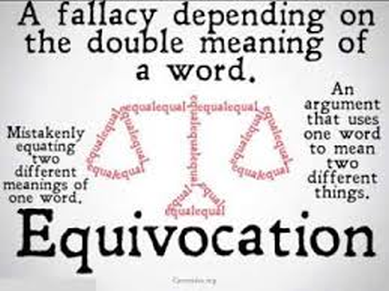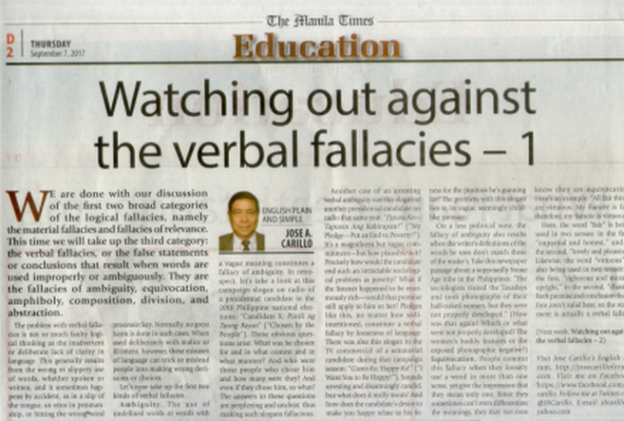We are done with our discussion of the first two broad categories of the logical fallacies, namely the
material fallacies and
fallacies of relevance. This time we will take up the third category: the
verbal fallacies, or the false statements or conclusions that result when words are used improperly or ambiguously. They are the fallacies of
ambiguity,
equivocation,
amphiboly,
composition,
division, and
abstraction.
The problem with verbal fallacies is not so much faulty logical thinking as the inadvertent or deliberate lack of clarity in language. This generally results from the wrong or slippery use of words, whether spoken or written, and it sometimes happens by accident, as in a slip of the tongue, an error in penmanship, or hitting the wrong word processor key. Normally, no great harm is done in such cases. When used deliberately with malice or ill intent, however, these misuses of language can trick or mislead people into making wrong decisions or choices.
Let’s now take up the first two kinds of verbal fallacies.
Fallacy of ambiguity. The use of undefined words or words with a vague meaning constitutes a fallacy of ambiguity. In retrospect, let’s take a look at this campaign slogan on radio of a presidential candidate in the 2010 Philippine national elections: “Candidate X:
Pinili ng Taong Bayan” (“Chosen by the People”). These obvious questions arise: What was he chosen for and in what context and in what manner? And who were those people who chose him and how many were they? And even if they chose him, so what? The answers to these questions are perplexing and unclear, thus making such slogans fallacious.
Another case of an arresting verbal ambiguity was this slogan of another presidential candidate on radio that same year:
“Panata Ko—Tapusin Ang Kahirapan!” (“My Pledge—Put an End to Poverty!”). It’s a magnificent but vague commitment—but how plausible is it? Precisely how would the candidate end such an intractable sociological problem as poverty? What if the listener happened to be enormously rich—would that promise still apply to him or her? Pledges like this, no matter how well-intentioned, constitute a verbal fallacy by looseness of language.
There was also this slogan in the TV commercial of a senatorial candidate during that campaign season:
“Gusto Ko, Happy Ka!” (“I Want You to Be Happy!”). Sounds arresting and disarmingly candid, but what does it really mean? And how does the candidate’s desire to make you happy relate to his fitness for the position he’s gunning for? The problem with this slogan lies in its vague, seemingly child-like message.
On a less political note, the fallacy of ambiguity also results when the writer’s definitions of the words he uses don’t match those of the reader’s. Take this newspaper passage about a supposedly Stone Age tribe in the Philippines: “The sociologists visited the Tasadays and took photographs of their half-naked women, but they were not properly developed.” (How was that again? Which or what were not properly developed? The women’s bodily features or the exposed photographic negative?)
Equivocation. People commit this fallacy when they loosely use a word in more than one sense, yet give the impression that they mean only one. Since they sometimes can’t even differentiate the meanings, they may not even know they are equivocating. Here’s an example: “All fair things are virtuous. My fiancée is fair; therefore, my fiancée is virtuous.”



Here, the word “fair” is being used in two senses: in the first, “impartial and honest,” and in the second, “lovely and pleasing.” Likewise, the word “virtuous” is also being used in two senses: in the first, “righteous and morally upright,” in the second, “chaste.” Both premise and conclusion therefore aren’t valid here, so the statement is actually a verbal fallacy.
(Next week:
Watching out against the verbal fallacies – 2) September 14, 2017
 This essay appeared in the column “English Plain and Simple” by Jose A. Carillo in the Education Section of the September 7, 2017 issue (print edition only) of
This essay appeared in the column “English Plain and Simple” by Jose A. Carillo in the Education Section of the September 7, 2017 issue (print edition only) of The Manila Times
, © 2017 by the Manila Times Publishing Corp. All rights reserved.RETROSPECTIVE - THE FULL SERIES ON LOGICAL FALLACIES:July 20, 2017:
Watching out against the material fallacies – 1July 27, 2017:
Watching out against the material fallacies – 2August 10, 2017:
Watching out against the fallacies of relevance – 1August 17, 2017:
Watching out against the fallacies of relevance – 2August 24, 2017:
Watching out against the fallacies of relevance – 3August 31, 2017:
Watching out against the fallacies of relevance – 4September 7, 2017:
Watching out against the verbal fallacies – 1September 14, 2017:
Watching out against the verbal fallacies – 2